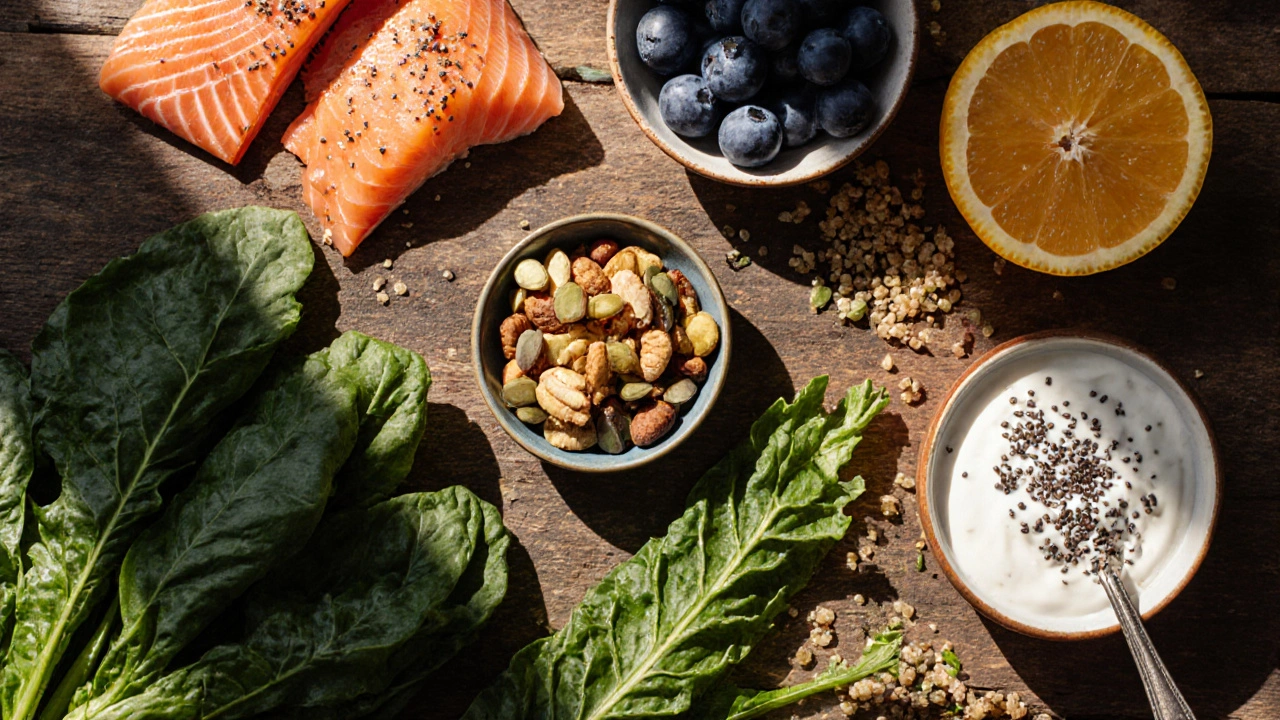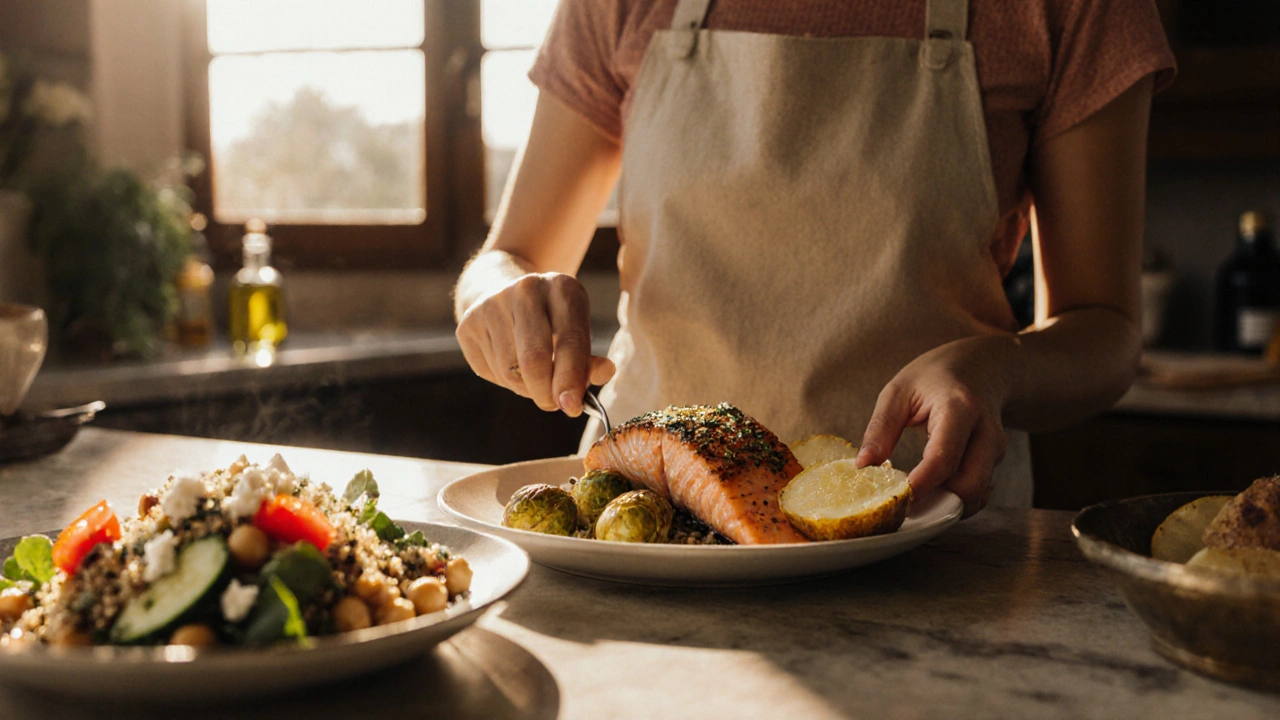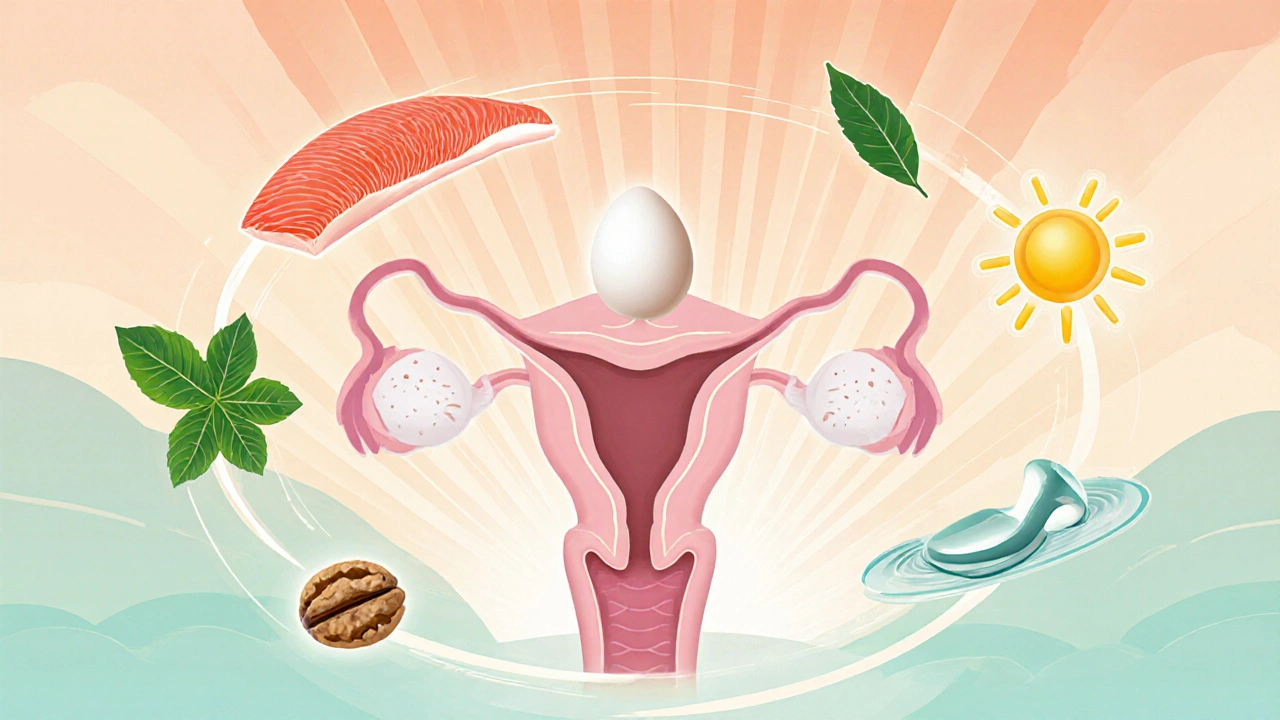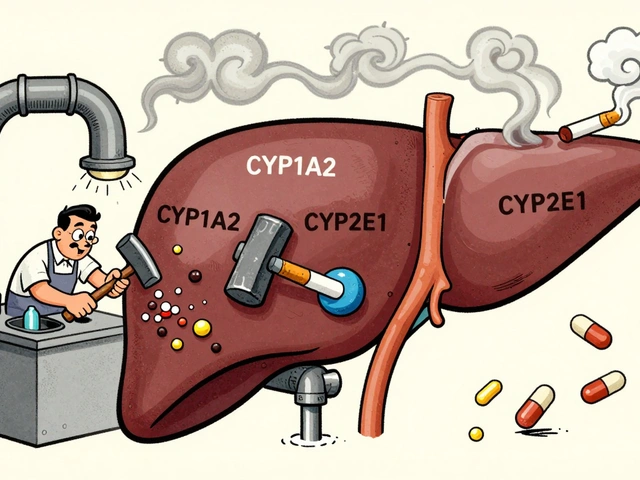Fertility Meal Builder
Build Your Fertility Meal Plan
Select foods from the Mediterranean-style fertility plan to create a balanced meal that supports ovulation health.
Key Takeaways
- Balanced macronutrients and specific micronutrients can improve ovulation regularity.
- Mediterranean‑style eating patterns are linked to higher pregnancy rates.
- Low‑glycemic carbs, omega‑3s, folate, vitamin D, iron, and antioxidants are fertility boosters.
- Highly processed foods, trans fats, excess caffeine, and alcohol may hinder ovulation.
- A simple weekly meal plan can help you get the right nutrients without extra hassle.
Understanding Ovulation and Fertility
When you hear the words Fertility is the ability to conceive and sustain a pregnancy, you might think it’s all about hormones. Hormones are a big piece, but what you eat feeds those hormones. Ovulation is the monthly release of a mature egg from the ovary, ready for fertilisation. If the egg isn’t released on schedule, the window for pregnancy narrows.
Research from the American Society for Reproductive Medicine (2023) shows women who follow a nutrient‑rich diet have a 20‑30% lower risk of anovulatory cycles. That’s a clear sign that what lands on your plate can dictate how reliably your body follows its reproductive clock.
Nutrition Basics for Reproductive Health
Think of nutrition as a toolbox. Each nutrient has a specific job that supports the hormonal cascade, egg quality, or uterine lining. Below are the core groups you need to focus on:
- Macronutrients: balanced carbs, quality protein, and healthy fats keep insulin stable, which in turn protects hormone balance.
- Micronutrients: vitamins and minerals such as folate, vitamin D, iron, selenium, and zinc directly impact egg maturation and implantation.
- Phytonutrients & antioxidants: these protect eggs from oxidative damage, improving quality.
Most fertility‑focused guidelines recommend a calorie intake that matches your activity level-no extreme restriction. Undereating can lower leptin, a hormone that signals the brain that the body isn’t ready for pregnancy, leading to missed ovulation.

Foods That Boost Ovulation and Fertility
Here’s a practical cheat‑sheet of foods packed with the nutrients we just discussed. The list is based on multiple cohort studies (e.g., Nurses’ Health Study II, 2022) that linked higher consumption of these items with better reproductive outcomes.
- Leafy greens (spinach, kale) - high in folate and iron.
- Fatty fish (salmon, sardines) - rich in omega‑3 fatty acids and vitamin D.
- Nuts & seeds (walnuts, flaxseeds, chia) - source of omega‑3s, zinc, and selenium.
- Whole grains (quinoa, brown rice, oats) - low‑glycemic carbs that stabilise insulin.
- Berries and citrus fruits - antioxidants and vitamin C for hormone metabolism.
- Legumes (lentils, chickpeas) - plant‑based protein, folate, and iron.
- Greek yoghurt - calcium and probiotic support for gut‑hormone axis.
Foods and Habits to Limit
Just as some foods help, others actively harm ovulation. Cutting back on these can make a noticeable difference:
- Highly processed snacks - loaded with trans fats that raise inflammation.
- Excess sugar & refined carbs - cause insulin spikes, leading to hormonal imbalance.
- Caffeine over 300mg per day (about three cups of coffee) - associated with lower implantation rates in some studies.
- Alcohol >5 drinks per week - can reduce estrogen and progesterone levels.
- High‑sodium foods - may affect blood flow to the uterus.
Sample Weekly Meal Plan (Mediterranean‑Style)
The Mediterranean diet consistently scores highest in fertility research. Below is a simple 7‑day plan that hits all the key nutrients without requiring a culinary degree.
- Monday: Breakfast - Greek yoghurt with berries and a sprinkle of chia; Lunch - Quinoa salad with chickpeas, cucumber, tomato, feta, olive oil; Dinner - Baked salmon, roasted Brussels sprouts, and sweet potato.
- Tuesday: Breakfast - Oatmeal topped with walnuts and sliced banana; Lunch - Lentil soup with spinach; Dinner - Stir‑fried tofu, bell peppers, and brown rice.
- Wednesday: Breakfast - Smoothie (spinach, mango, almond milk, flaxseed); Lunch - Whole‑grain wrap with hummus, arugula, roasted veg; Dinner - Grilled sardines, quinoa tabbouleh.
- Thursday: Breakfast - Avocado toast on whole‑grain bread, poached egg; Lunch - Mixed bean salad with olive oil vinaigrette; Dinner - Turkey meatballs, tomato sauce, zucchini noodles.
- Friday: Breakfast - Cottage cheese with pineapple and pumpkin seeds; Lunch - Spinach & strawberry salad with almonds; Dinner - Baked cod, lemon, asparagus, wild rice.
- Saturday: Breakfast - Scrambled eggs with smoked salmon and sautéed kale; Lunch - Mediterranean quinoa bowl (olive, olives, feta, cherry tomatoes); Dinner - Veggie pizza on cauliflower crust, side of mixed greens.
- Sunday: Breakfast - Protein‑rich pancakes (oat flour, egg whites) topped with fresh berries; Lunch - Roasted chicken, sweet corn, and beet salad; Dinner - Lentil‑based stew with carrots and parsley.
Snack ideas: a handful of almonds, carrot sticks with hummus, or a piece of fruit. Aim for 5‑6 small meals a day to keep blood sugar steady.

Key Nutrients at a Glance
| nutrient | recommended daily amount | fertility benefit |
|---|---|---|
| Folate (vitamin B9) | 400‑800µg | supports DNA synthesis, reduces risk of ovulatory disorders |
| Omega‑3 fatty acids (EPA/DHA) | ≥1000mg | improves egg quality, reduces inflammation |
| Vitamin D | 600‑2000IU (based on blood levels) | enhances hormone production, may increase implantation |
| Iron | 18mg (women of child‑bearing age) | prevents anemia, supports oxygen delivery to ovaries |
| Zinc | 8‑11mg | critical for oocyte maturation and progesterone synthesis |
| Antioxidants (vitC, vitaminE, selenium) | varies - aim for fruit/veg servings ≥5 per day | protects eggs from oxidative stress |
Common Pitfalls & How to Avoid Them
Even with a solid plan, mistakes creep in. Here are the most frequent slip‑ups and quick fixes:
- Skipping meals - leads to blood‑sugar crashes; set alarms for regular snack breaks.
- Relying on “fertility smoothies” with hidden sugars - read labels, keep added sugars under 5g per serving.
- Neglecting hydration - dehydration can thicken cervical mucus; aim for 2‑2.5L water daily.
- Over‑supplementing - megadoses of nutrients (e.g., >1000µg folic acid) may backfire; stick to recommended amounts unless a doctor advises otherwise.
- Ignoring gut health - poor microbiome disrupts estrogen metabolism; include fermented foods like kefir or kimchi.
Frequently Asked Questions
Can a specific diet cure infertility?
Diet alone rarely “cures” infertility, but a nutrient‑rich eating pattern can improve ovulation frequency, egg quality, and the chances of conception when combined with medical guidance.
How much folate should I eat versus supplement?
Aim for 400‑800µg from foods such as leafy greens, beans, and citrus. Many clinicians recommend a 400µg folic‑acid supplement pre‑conception to ensure adequate levels.
Is caffeine really that bad for getting pregnant?
Moderate caffeine (up to 200‑300mg/day) appears safe for most women. Higher intake has been linked to slightly lower implantation rates, so consider cutting back if you’re a heavy coffee drinker.
Should I avoid all dairy to improve fertility?
Full‑fat dairy can be part of a balanced fertility diet, especially when it provides calcium and vitamin D. If you’re lactose intolerant or have high inflammation, choose fermented options like kefir or opt for plant‑based fortified milks.
How long does it take to see changes in ovulation after diet tweaks?
Most women notice more regular cycles within 1‑3months of adopting a nutrient‑dense, low‑glycemic diet. Consistency is key; short‑term “crash” diets can disrupt hormone balance.
By aligning your plate with the science behind diet and fertility, you give your body the best chance to regulate ovulation and support a healthy pregnancy. Remember, food is a powerful tool, but it's most effective when paired with regular medical check‑ups and a lifestyle that reduces stress, ensures sleep, and encourages gentle movement.






Comments
Solid info, thanks for the breakdown.
Wow, a Mediterranean diet can actually improve baby‑making? Who knew the secret was just more hummus and less pizza.
This so‑called “fertility diet” is just another excuse for the West to push its olive‑oil propaganda while ignoring real genetic factors.
I love how the post breaks down each nutrient and ties it directly to the hormonal orchestra that runs ovulation.
When you think about folate, imagine it as the scaffolding that lets the egg build its DNA without a glitch.
Omega‑3s then act like the oil that keeps the gears moving smoothly, reducing inflammation that could otherwise sabotage the process.
Vitamin D, often called the sunshine vitamin, actually signals the brain that it’s safe to release an egg.
Iron is the carrier that makes sure the ovaries get enough oxygen, because a hypoxic environment is not friendly to egg health.
Antioxidants serve as the body’s vacuum cleaners, sweeping away free radicals that would otherwise damage the delicate oocyte.
The Mediterranean‑style meals highlighted in the article are perfect because they naturally pack all of these elements without feeling like a supplement regimen.
For example, a breakfast of Greek yogurt with berries gives you probiotic power plus a solid dose of vitamin D and antioxidants.
A lunch of quinoa salad with chickpeas provides plant‑based protein, iron, and folate all in one colorful bowl.
Dinner featuring baked salmon with Brussels sprouts delivers the omega‑3 jackpot along with extra folate from the veggies.
What’s especially handy is the recommendation to eat five to six small meals a day, which steadies insulin and prevents the hormonal rollercoaster that can knock ovulation off‑track.
Sticking to low‑glycemic carbs like oats or quinoa keeps blood sugar from spiking, which in turn keeps leptin levels stable.
Avoiding processed snacks and excess caffeine further reduces inflammatory triggers that could impair follicle development.
If you’re tracking your cycle, you’ll notice that a balanced diet often smooths out irregularities within a couple of months.
Remember, nutrition is only one piece of the puzzle; sleep, stress management, and regular movement also play huge roles.
Overall, the article gives a clear, actionable roadmap that anyone trying to boost fertility can follow without needing a culinary degree.
That overview really nails why each food group matters – the way you linked folate to DNA scaffolding made the science feel tangible.
I also appreciate the reminder about steady meals; keeping insulin flat is a game‑changer for hormone balance.
One practical tip you could add is pairing iron‑rich foods with vitamin C sources, like a citrus vinaigrette on a spinach salad, to boost absorption.
Overall, the step‑by‑step meal builder feels like a cheat‑sheet for busy couples, and the nutrient breakdown gives confidence that you’re hitting the right targets.
Keep the long‑term perspective, because results often show up after a few cycles, not overnight.
One evidence‑based addition: consider a daily prenatal‑type supplement that provides 400‑800 µg of folic acid, especially if dietary intake might fall short on hectic weeks.
Studies show that combined dietary folate and supplemental folic acid reduce the risk of anovulatory cycles more than diet alone.
Just make sure the supplement also includes vitamin D and omega‑3s to cover the other key players highlighted in the article.
I think the plan looks very feasable, but maybe add a note about checking iron levels if youve got a heavy period.
Low iron can really throw off ovulation timing, so a quick blood test could help tailor the diet.
Honestly, this whole “miracle meal plan” feels like a thinly veiled sales pitch, yet the data isn’t completely bogus – the Mediterranean diet does have solid research backing it. 🙄
While the content is generally accurate, please note that "antioxidants" are a broad category and not all have the same effect on oocyte quality.
Yo, I think it’s cool but also kinda hype‑y – like, do we really need a whole meal builder for this? 😆
it works but keep it simple dont overthink it
Great guide! Just remember to stay hydrated and get some daily movement – it all adds up.
Ah, the culinary poetry of fertility! One might say the plate becomes a canvas upon which the very essence of life is brushed, each bite a brushstroke of destiny.
I get what you’re saying and I’ll try to follow it, but I’m also juggling a full‑time job, so realistic tips are appreciated.
In the grand theater of existence, nutrition assumes the role of an unsung protagonist, guiding the silent symphony of conception with a subtle yet inexorable hand.
Oh sure, because adding a splash of olive oil will magically fix everything – sarcasm fully intended.
Super helpful! 😊 I’ll try the salmon‑and‑brussels sprouts combo tonight; the omega‑3 boost sounds perfect for hormone balance.
I’m curious how quickly you might see changes in cycle regularity after switching to this plan – any personal anecdotes?